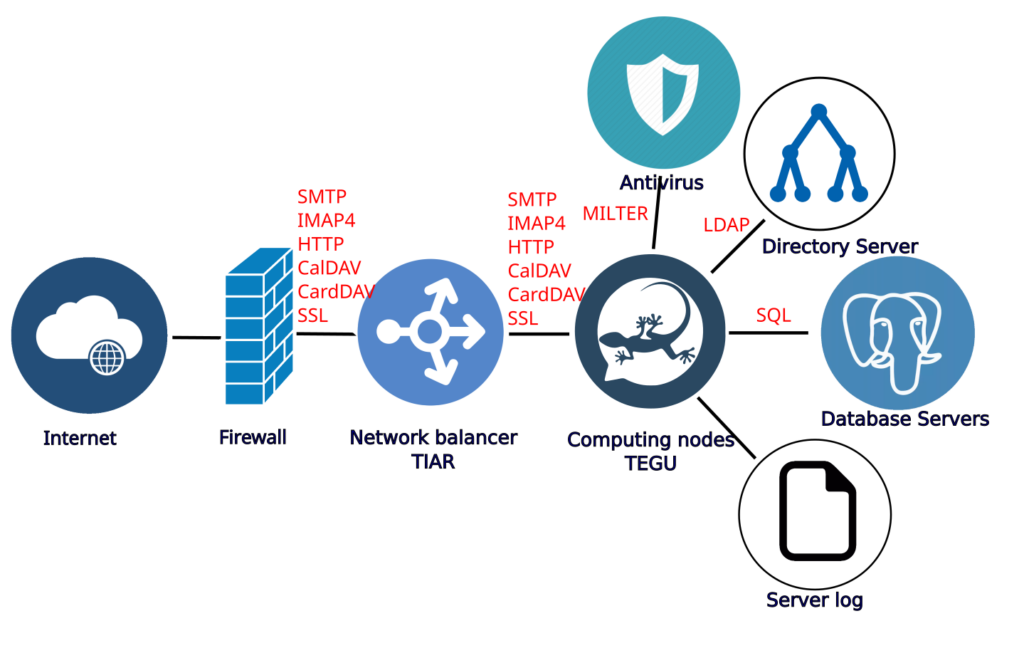
Tegu is a geo-distributed high-load software based on modern Russian servers running on client hardware (on-premises) with Linux operating system, including mail service, address book and calendar.
Tegu is entirely of Russian origin, developed from scratch as a high-load clustered application, with no borrowings, built on an original architecture. This makes it the preferred alternative to Western software in the BRICS countries.
The server is registered with the Russian Software Registry, supports all Russian and Chinese operating systems and hardware architectures, and can be integrated with a large number of related systems.
The unique properties of TEGU
The server was originally created as a high-load server application. All server components are differed by their original philosophy and architecture, what has a positive effect on its actual security, undemanding hardware resources and ease of installation and maintenance. Some unique properties of the server are given below:
- Completely in-house development (without borrowing code or libraries). That doesn’t mean that we couldn’t fork something suitable from the Internet and put our own label on it. There is simply nothing to fork – Open Source does not have components suitable for highly loaded servers.
- TEGU is a high-load application that uses asynchronous data processing mode.
- TEGU is a scalable application. It is a cluster of symmetric independent computing nodes.
- TEGU is a hot standby application. The cluster retains full functionality as long as at least one server node is operational.
- TEGU does not use a multi-layered architecture (frameworks, libraries, etc.). This fundamental property facilitates installation and updating, and most importantly, reduces the attack surface by several orders of magnitude. Consequently, it leads to a qualitatively new level of safety and fault tolerance under critical loads.
- TEGU is a secure application. In other words, the security features are integrated into the application itself. TEGU does not require a proxy installed in front of it, it works safely directly.
- TEGU is undemanding to hardware resources, its performance is 20 times higher than its analogues.
- TEGU does not synchronize directory server data, so it basically cannot compromise user credentials.
- TEGU has a built-in unique mail migration system from other servers.
- TEGU is not installed from deb, rpm or snap. Tegu is the only monolithic compiled executable file that does not use system libraries (all of them were written by us independently). This ensures that the developer has full control over the code behavior, no conflicts with the OS batch database, and saves hardware resources. The consequence of this property is also the ease of installation and maintenance of the server.
- TEGU does not have inter-node traffic. Due to this, the number of computing nodes is theoretically unlimited and in fact we have not exhausted. This allows you to scale the server to hundreds of thousands of users.
- TEGU never, under any pretext, sends your data, statistics, licensing information, does not perform automatic updates, does not check the availability of new versions and does not install remote plugins. It only sends mail to your users.
The described properties make TEGU unique in the line of mail servers. Code independence (non-use of other people’s components) in combination with a competent architecture makes the application completely predictable and reliable in operation. Thanks to this, we were able to reduce the costs of technical support and development. That’s why TEGU comes at reasonable prices.
TEGU Editions
- TEGU Enterprise – symmetric fault-tolerant scalable cluster with data storage (configurations, queues, messages, etc.) in the Postgres DB.
- A free edition of TEGU (Freeware) is also available for small businesses. TEGU (freware) is built on the classic (simplest) architecture based on Maildir storage, without support for address books and calendars.
TEGU Enterprise Functions
Mail Service
- Protocols
- IMAP/SMTP
- SSL
- LDAP
- Milter
- SPF, DKIM, DMARC
- HTTPS
- CalDAV
- CardDAV
- WebDAV
- System functions
- Mail Transfer Agent (MTA) and Mail Delivery Agent (MDA) functions
- SMTP-relay function
- SMTP-smarthost function
- Asynchronous request processing mode
- Any quantity of Internet domains
- Standalone operating mode (local user base in JSON format)
- Integration with an any quantity of LDAP3 directory services for user authentication (Windows Active Directory, Samba4, FreeIPA, ALD Pro, Red ADM)
- Multitenancy
- Universal Acceptance Readiness IDN/EAI [RFC5336]
- Physical or virtual environment execution support
- Symmetric load balancing multi-server cluster of computing nodes
- Hot redundancy cluster
- The possibility of horizontal scaling of the platform up to 500 thousand users
- Geo-distributed and fault-tolerant data storage in PostgreSQL, YugabyteDB, CockroachDB
- A graphical web interface that implements centralized management of all computing nodes
- Recovering deleted messages function “Recovery Folder”
- Real-time backup support
- Quoting the size of mailboxes and email-messages
- Server activity log Journalctl
- Seamless migration of users from the old mail server support
- Master-users support
- Interface languages – Russian, Chinese, English
- Technical documentation languages – Russian, English
- System log language – English
- Technical support language – Russian, English
- Security features
- White, gray, and black lists support
- Sender Policy Framework (SPF)
- Domain Keys Identified Mail DKIM
- Domain-based Message Authentication, Reporting and Conformance (DMARC)
- Integration with external virus protection systems (SMTP-relay & Milter protocol)
- Integration with external security information management systems (SIEM)
- Limiting the number of failed login attemps
- Registration of information security events
- Mail functions
- Shared hierarchical IMAP folders for users and domain groups
- Rules for processing incoming and outgoing messages at the administrator and user levels:
- Moving, auto-replies, redirects, flag changes depending on the direction, date, size, number of spam points
- Conversion of addresses and sending directions (including at the stage of the SMTP session)
- Preliminary mesages moderation
- Prohibiting sending to internal and external addresses, to groups and group members, and limiting the number of emails sent.
- Manage notifications about restrictions and filtering and more.
- Profile Properties Control Panel (web interface)
- Additional mailing addresses (aliases) support
- Internal and external mailing groups support
- Changing the server configuration without interrupting the service
- Autoconfiguration of mail user programs (autoprovision)
- Support for proprietary protocols
- Proprietary protocols are not supported and will not be
Addressbook Service
- Global Address List (GAL) available via CardDAV protocol
- Support for contacts from all directory servers in a single address book
- System Addressbooks via CardDAV protocol
- Personal Addressbooks via CardDAV protocol
- Personal and System Addressbook sharing for users and gropus
- Access Control List of addressbooks
- Autoconfiguration of addressbook programs (autoprovision)
Calendar Service
- CalDAV Calendar Server support
- Any quantity of custom calendars
- The ability to limit the visibility of events in time (to limit the size of the synchronization file)
- Personal and System Calendars sharing for users and gropus
- Access Control List of Calendars
- The “head-secretary” function
- Free/busy function
- Sending notifications by means of the client or server
- Autoconfiguration of calendars programs (autoprovision)
Architecture

TEGU Compatibility
TEGU is available for any Linux versions for x86_64 and aarch64 (ARM64) hardware platforms.
- Отечественные ОС
- Альт Сервер [Х86_64] [aarch64] [Ссылка на пресс-релиз]
- РЕД ОС вер. 7.3 , вер. 8 [Ссылка на пресс-релиз]
- ASTRA linux
- Роса ХРОМ
- ОС Атлант
- СУБД
- PostgreSQL (не ниже 13 версии)
- Postgres Pro (не ниже 13 версии)
- Антивирсное и антиспамовое ПО
- Подпись и шифрование
- DLP системы
- Средства синхронизации
- Прикладное ПО
The largest commercial installation currently includes 85 thousand users on a single server, but this is far from the limit for TEGU. We are also proud that a huge number of users use our free version.


